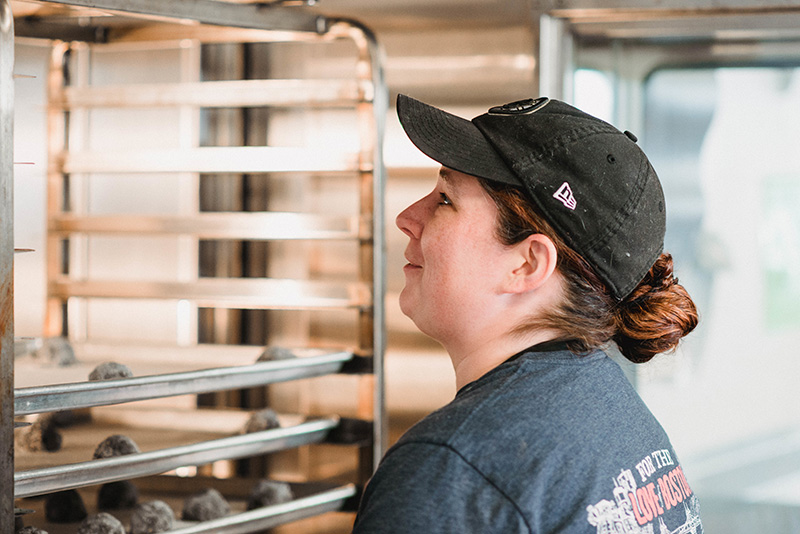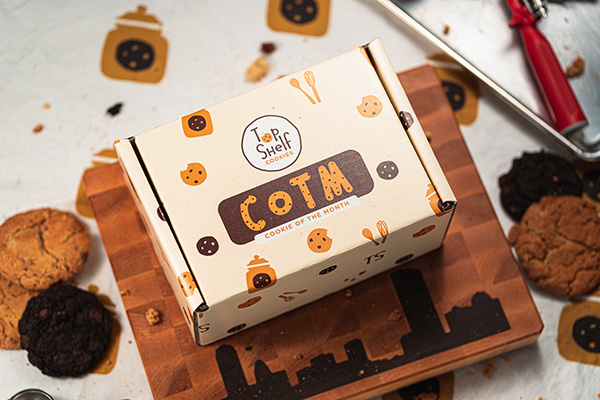Resilience.
Surviving – and growing – through a pandemic.
Top Shelf Cookies
ICIC Programs:
Inner City Capital Connections (ICCC)
Cultivate Small Business (CSB)
Heather Yunger is no stranger to taking chances.
The seeds for her cookie business were planted in 2011 during the Boston Bruins’ Stanley Cup run. Yunger, a Bruins season ticket holder, created the “black and gold” – a dark chocolate cookie with peanut butter chips. She brought them to a local pub before every game that season and they became a good luck charm as the team went on their championship run.
Yunger saw the fun and happiness her baking created and decided to launch a side business through social media and a website. It quickly grew into her new passion and soon, a career.
“I said to myself, ‘What if I just made cookies for a living,’” she recalls.
Frustrated with her office job, she made the jump in 2013 and started baking full time. She started Top Shelf Cookies working out of CommonWealth Kitchen, a nonprofit small business incubator for the food industry in Boston and sold mostly online and at events like the Boston Marathon.
As her business expanded, she outgrew the shared kitchen space at CommonWealth and started looking for her own storefront and bakery. It was March 2020, just before lockdowns upended the national economy and decimated the hospitality and food industry.
Unaware that the city and country were about to be shutdown, she found a location that checked all her boxes. It was in Adams Village in the Dorchester section of Boston, and it had everything she needed: a loading area, parking, foot traffic, high visibility on a main road and the rent was reasonable.
She signed a lease just as the city and the nation were locked down. Everything she had worked for her entire life, including her life’s savings, were invested into the new location and she was terrified. The gamble she took in pursuit of happiness and career satisfaction, was looking to be a bad one.
“Eighty percent of our revenue shut down in four hours,” she remembers. “Customers were shutting down, recurring orders were being canceled. Weddings, baby showers, anniversaries were all canceled.”
“It was five years of my life and through nothing I could control, it was all shut down. I put everything I had into this,” she adds. “It was awful. It was the worst feeling I’ve ever had in my life.”

FRESH OUT OF THE OVEN
Top Shelf makes 2,000 cookies daily.

Refusing to crumble
She worried about how she was going to pay her small staff, rent, vendors, utilities, and other bills, buy supplies, and she was in the middle of a buildout in the new space. She planned on moving into the new store by Christmas 2020, just in time for the holiday rush, which makes up roughly a quarter of her annual business.
The pandemic lingered on though, and she struggled and fought. She wrote a blog post about her situation that was shared more than 1,000 times on social media. The community rallied behind her, and online sales exploded. She and her staff worked night and day to keep up with orders and keep the business afloat during the darkest days of the lockdowns.
“I can sit here and be scared or keep moving,” she says. “It was survival mode, but I knew our online business would take care of a lot.”
She was right. The business made it through the worst of the pandemic, and she did a successful crowdsourced fundraising campaign to bring in investors to help pay for the buildout of the new storefront. She raised more than $130,000 which is paid back to investors via five percent of revenue.
Yunger attributes much of her creative business decisions, and her resiliency, to lessons she learned while participating in the Cultivate Small Business program in 2018. She attended the program at Babson University, meeting twice a month with business mentors while learning about budgeting, marketing, advertising, production costs and more.
“You’re getting a Babson education,” she says. “A lot of what I needed to learn was delegating and building for scalability. There were all kinds of amazing speakers. And it was a valuable networking opportunity with 30 other small business owners. We collaborated and listened to each other and a lot of times they see things about your business you may not see.”
“A lot of what I needed to learn was delegating and building for scalability … It was a valuable networking opportunity with 30 other small business owners. We collaborated and listened to each other and a lot of times they see things about your business you may not see.”
SPECIAL DELIVERIES
A delivery truck arrives at Top Shelf daily to pick up 40-80 boxes, many of which are filled with fresh-baked treats and shipped to Cookie of the Month subscribers.
Building volume
Having emerged from the pandemic with her business not only intact, but growing, Top Shelf’s shop is now a beehive of activity as she and her staff bake more than 2,000 cookies a day. While she used to go to the post office each day with just a few packages to mail out, these days a delivery truck arrives daily to pick up 40-80 boxes, many to fill monthly subscription orders.
The return of events, like the Boston Marathon, and local Farmer’s Markets have added to her sales volume, as has foot traffic at the shop. She’s also gotten her cookies into several specialty markets, and more are on the horizon. To position her business for the next stage of growth, Yunger is participating in ICIC’s Inner City Capital Connections program while she continues to network with other businesses that she met through ICIC, as well as her Babson mentor, and educates herself by reading business publications and listening to podcasts.
While 2020 was a struggle, Yunger is grateful for all she has and excited about her growth potential and the future.
“A lot of times I think things happen for a reason, as generic as that sounds,” she said. “I love it. Even when I’m feeling stressed out, which I am often, I can’t even imagine myself working in a cubicle ever again. That fear when the pandemic hit, I don’t want that again. But I like my unpredictable life.”
